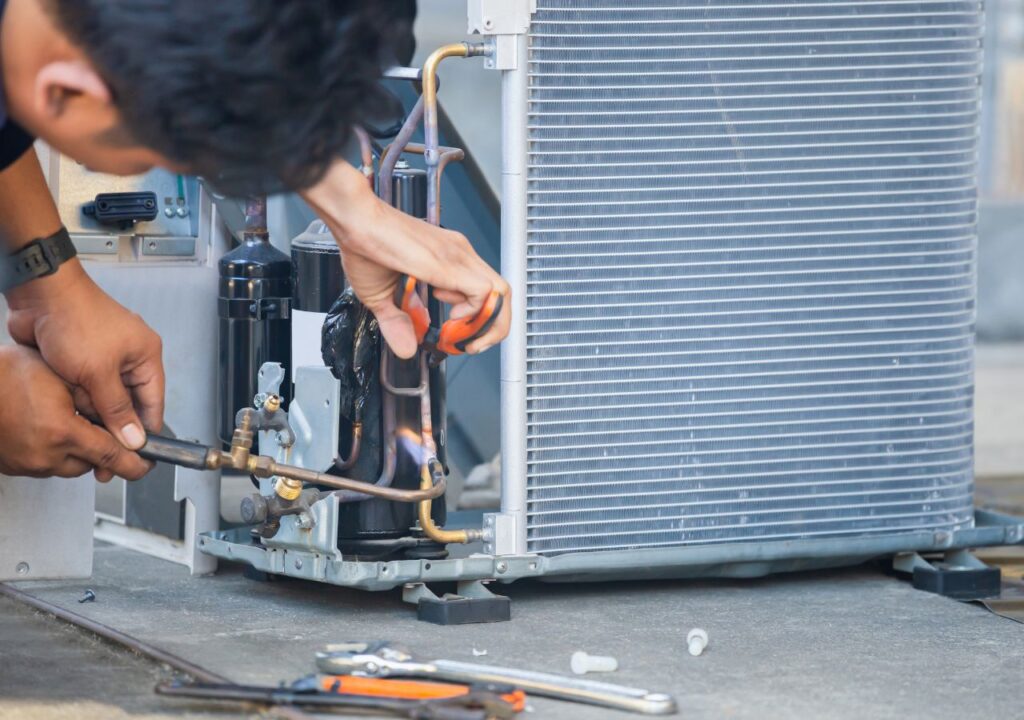Indoor air quality (IAQ) has become a critical health and comfort issue in both residential and commercial settings. As buildings become more energy-efficient and airtight, the potential for indoor air pollution increases unless properly managed. Heating, ventilation, and air conditioning (HVAC) systems play a pivotal role in managing indoor air quality. Effective HVAC solutions can drastically improve both the health and comfort of indoor environments by controlling air pollutants, humidity, and temperature. This article explores the importance of indoor air quality, identifies common indoor air pollutants, and discusses how to optimize HVAC systems to enhance air quality and ensure a healthier, more comfortable indoor environment.
UNDERSTANDING INDOOR AIR QUALITY
The Importance of Good Indoor Air Quality
Indoor air quality refers to the quality of the air within and around buildings and structures, especially as it relates to the health and comfort of building occupants. Understanding and controlling common pollutants indoors can help reduce the risk of indoor health concerns including respiratory infections, lung cancer, and chronic lung diseases such as asthma. Good IAQ is also essential for comfort, helping to maintain a pleasant, safe, and healthy environment in which individuals can live, work, and learn.
Common Indoor Air Pollutants
The most common indoor air pollutants include particulate matter (PM), volatile organic compounds (VOCs), carbon monoxide (CO), nitrogen dioxide (NO2), and biological pollutants such as mold and pollen. These pollutants can originate from a variety of sources, both inside and outside the building. Indoor sources such as tobacco smoke, cooking, and the use of cleaning chemicals or personal care products can release pollutants directly into the indoor environment. Outdoor sources like vehicle exhausts and industrial emissions can enter buildings through open windows, doors, and ventilation systems.
STRATEGIES FOR EFFECTIVE HVAC SOLUTIONS
Enhancing Ventilation
Enhancing the ventilation rate in buildings is a primary strategy for improving indoor air quality. Increasing the amount of outdoor air entering the HVAC system helps dilute accumulated indoor air pollutants. However, simply opening windows and doors is not always practical due to external pollution, weather conditions, and energy efficiency concerns. Mechanical ventilation systems can be designed to provide adequate fresh air, suited to the specific needs and constraints of a building.
Filtration Technologies
Effective filtration is crucial for trapping particulate matter and other pollutants. Modern HVAC systems equipped with HEPA filters or other advanced filtration technologies can significantly reduce the concentration of harmful particles in the air. Regular maintenance and replacement of filters as per the manufacturer’s recommendations ensure these systems continue to operate effectively.
Controlling Humidity
Maintaining an optimal range of humidity indoors is vital for both health and comfort. High humidity can encourage the growth of mold and mildew, while low humidity can cause respiratory problems and irritate mucous membranes. HVAC systems with built-in humidifiers and dehumidifiers can regulate indoor humidity levels, keeping them within a healthy range.
Integrating Smart HVAC Controls
Smart HVAC controls enhance indoor air quality by dynamically adjusting the operation of the system based on real-time data. These systems can monitor various parameters such as CO2 levels, humidity, and pollutant concentrations, adjusting ventilation rates and filtration settings accordingly. Smart controls also improve energy efficiency by optimizing the operation of HVAC components, thus providing both environmental and economic benefits.
MONITORING AND MAINTENANCE
Regular Maintenance and Inspections
Regular maintenance of HVAC systems is essential for sustained air quality improvements. This includes routine inspections, cleaning of air ducts, and replacement of filters. Neglected HVAC systems can become a source of indoor air pollution themselves, due to the accumulation of dust and microbial growth in filters and ducts.
IAQ Monitoring
Continuous monitoring of indoor air quality helps identify issues before they become serious problems. Modern IAQ monitors can track a variety of pollutants and environmental parameters, providing valuable data that can be used to adjust HVAC operations and maintain optimal indoor air quality.
APPLICATIONS
Residential Applications
In residential settings, optimizing HVAC (Heating, Ventilation, and Air Conditioning) systems to improve air quality can profoundly enhance living conditions and overall home comfort. Implementing solutions like installing energy-recovery ventilators (ERVs), which help in maintaining a balanced environment by bringing in fresh outdoor air and expelling stale indoor air, can be a game changer. Additionally, using air purifiers, especially those equipped with HEPA filters capable of capturing fine particles including allergens, bacteria, and viruses, in conjunction with a well-maintained HVAC system, can significantly purify indoor air. Regular maintenance of these systems, including timely filter changes and system check-ups, is crucial to their effectiveness and efficiency in creating a healthier and more comfortable living environment.
Commercial and Industrial Settings
In commercial and industrial environments, the challenges of maintaining air quality are magnified due to larger spaces and higher occupancy levels. Customized HVAC solutions, tailored to the specific needs of these environments, can include more sophisticated filtration and ventilation systems, as well as automated controls that adjust settings based on the number of occupants and other usage patterns.
Intelligent HVAC Systems
Optimizing indoor air quality is paramount for the health and comfort of indoor environments. This can be achieved through effective Smart HVAC Technology solutions, which play a critical role in purifying the air we breathe indoors. By thoroughly understanding the various sources and detrimental effects of indoor pollutants, building owners and managers are empowered to take decisive action. Implementing advanced HVAC technologies, such as high-efficiency filters and air purifiers, is a step forward in combating airborne contaminants.
Moreover, regular maintenance is essential to ensure HVAC Energy Efficiency and longevity. Integrating smart controls can further enhance the system’s responsiveness to changes in indoor air quality, adjusting settings in real time for optimal environment management. Emphasizing continuous improvement and adaptation to the latest air quality standards and technologies will ensure that the benefits of improved indoor air quality are not only achieved but also maintained over time. This commitment to maintaining clean indoor air can significantly contribute to the overall well-being and productivity of occupants by providing a safer, more comfortable, and healthier living and working environment.


